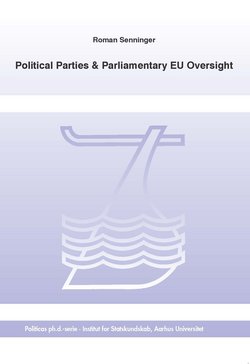Roman Senninger
Political Parties & Parliamentary EU Oversight

To expand our understanding of parliamentary EU oversight, this dissertation examines the actors who shape the organization and activities of parliaments in EU member states most crucially; political parties. Relying on longitudinal data, the dissertation demonstrates that party competition and issue-based party incentives are important factors explaining the substance of parliamentary EU oversight. Inside the national parliament, Eurosceptic parties use EU oversight activities in a different way than mainstream competitors, both with respect to content and timing. For example, Eurosceptic parties scrutinize general aspects of the EU (e.g., institutions and treaties) rather than specific EU policies. In addition, party competition affects parliamentary EU oversight beyond the national level. I show that parliamentarians at different levels who belong to the same party scrutinize similar policy issues. Moreover, I provide evidence that competing political parties also affect EU oversight institutions. When EU member states decide about the organization of European Affairs Committees, they consider information from other EU member states. This mechanism of learning and emulation is affected by the EU position of parties. In sum, parliamentary EU oversight is not always and necessarily about immediate influence on policy, but about the initiation of more general debates and the communication of viewpoints. Moreover, the dissertation advances existing knowledge about inter-parliamentary cooperation and shows that links between parties are important in explaining how members of different (foreign) institutions learn and act. The dissertation will be of interest to students and researchers of political parties, parliaments, and European integration.
![]() Ophavsretten tilhører Politica. Materialet må ikke bruges eller distribueres i kommercielt øjemed.
Ophavsretten tilhører Politica. Materialet må ikke bruges eller distribueres i kommercielt øjemed.